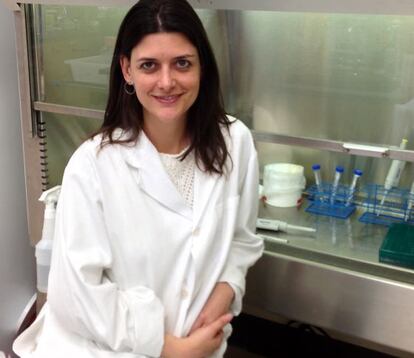“I wouldn’t think about going back to Spain for the moment”
After being fired from a Valencia research center, Nuria Martí is now part of the Oregon team behind this month’s embryonic stem-cell breakthrough

Eighteen months ago, Nuria Martí was sacked from her post at the Prince Felipe Research Center (CIPF), along with around 100 of its 250-member staff after the near-bankrupt Popular Party-controlled regional government of Valencia more than halved its funding contribution to the flagship biomedical facility set up in 2005.
Last week, the 33-year-old was among the four authors of a ground-breaking piece of research published in the prestigious journal Cell, describing how they successfully reprogrammed human skin cells to become embryonic stem cells capable of transforming into any other cell type in the body.
"I wanted to return to Spain at some point in the future, but I know that it isn't going to be anytime soon," says Martí by telephone from the Oregon Health & Science University (OHSU), based in Portland, where she has been working since 2012.
"Given the way things are, I wouldn't think about returning to Spain for the moment," she says. Martí joined the CIPF in 2006 after completing her degree program in biology at the University of Valencia, followed by a Master's in assisted reproduction to be used to write her doctoral thesis.
She joined the now-defunct regenerative medicine program led by Rita Cervera, a biologist who in 2010 was the first person to clone a fighting bull. Cervera supervised Martí's doctoral thesis on cloning pigs, which she has yet to present. "My intention was to defend it this year," she says.
When she first heard about the CIPF's plans to drastically cut back its staff, she began looking abroad for an institution to continue her work.
"It was around the end of 2011. My contract was due to run out in March, but things looked bad," she says. Through Cervera, who was already working at Oregon, she learned that the OHSU was looking for embryologists.
"On the same day I was sacked, I learned that that I had been accepted at OHSU," she says. Eventually, the CIPF would close 14 of its 26 laboratories.
On the same day I was sacked, I learned that OHSU had accepted me"
"Nuria has a watchmaker's hands. She is excellent at handling embryos," says Antonio Juan-Díez, her boss at CIPF's vascular repair and regeneration group, which has also been dismantled.
So why was she sacked from the research facility? "They threw out the people who were cheapest to get rid of, and who were paid directly by the center," says Juan-Díez, adding that Martí was being paid little more than around 1,000 euros a month.
She joined the OHSU in early 2012, and rapidly became a key member of the group led by Shoukhrat Mitalipov, which has for the first time successfully reprogrammed adult human skin cells.
"They were looking for somebody with experience in handling human cells, and thanks to my Master's I had that experience," she says. Since moving to the United States her professional life has rapidly improved. In October of last year she was part of another team led by Mitalipov that made a breakthrough in developing a technique to prevent mitochondrial diseases being transmitted by mothers through damage to their DNA. Her involvement in the pioneering stem-cell work published last week has raised her professional profile further.
She not only worked on the cell transference method, the process by which the nucleus of an ovule is extracted and then inserted into an adult cell where, with an identical genetic code to the adult cell, it will start to develop like an embryo. She also worked on the phase to obtain and cultivate the stem cells, and coordinated the selection program for fertilized eggs: "We chose the women and explained the program to them. I still haven't been able to take in all that we have done; this is an extraordinary experience," she says.
For the moment, Martí will remain in Portland with her husband: "He had a job in Spain, but we decided that this was a good time to get out of the country. There is no work for me there."
Tu suscripción se está usando en otro dispositivo
¿Quieres añadir otro usuario a tu suscripción?
Si continúas leyendo en este dispositivo, no se podrá leer en el otro.
FlechaTu suscripción se está usando en otro dispositivo y solo puedes acceder a EL PAÍS desde un dispositivo a la vez.
Si quieres compartir tu cuenta, cambia tu suscripción a la modalidad Premium, así podrás añadir otro usuario. Cada uno accederá con su propia cuenta de email, lo que os permitirá personalizar vuestra experiencia en EL PAÍS.
¿Tienes una suscripción de empresa? Accede aquí para contratar más cuentas.
En el caso de no saber quién está usando tu cuenta, te recomendamos cambiar tu contraseña aquí.
Si decides continuar compartiendo tu cuenta, este mensaje se mostrará en tu dispositivo y en el de la otra persona que está usando tu cuenta de forma indefinida, afectando a tu experiencia de lectura. Puedes consultar aquí los términos y condiciones de la suscripción digital.








































